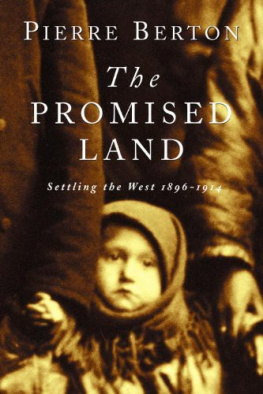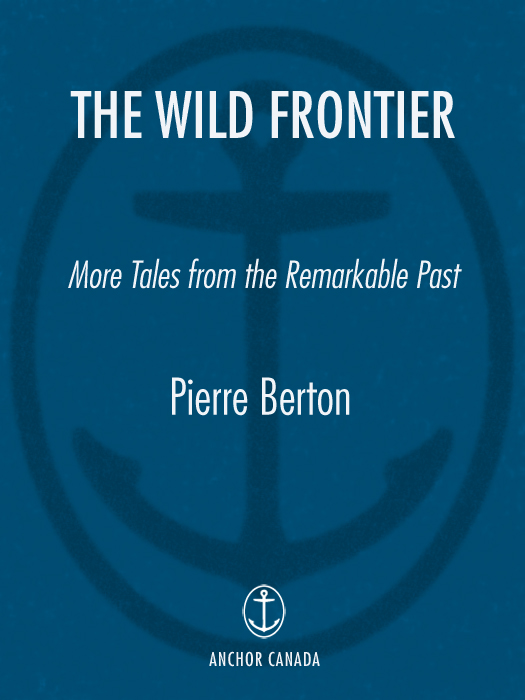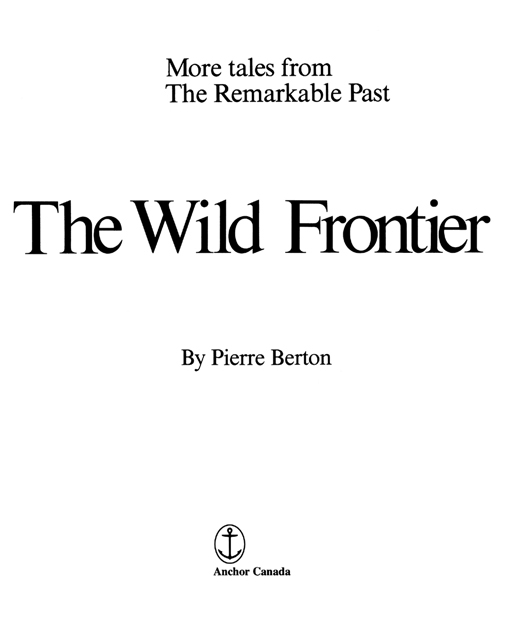Let us probe the silent places,
let us seek what luck betide us;
Let us journey to a lonely land I know.
Theres a whisper in the night-wind,
theres a star agleam to guide us
And the Wild is calling, calling let us go.
Robert W. Service
Copyright 1978 by Pierre Berton Enterprises Ltd.
Anchor Canada edition 2005
All rights reserved. The use of any part of this publication, reproduced, transmitted in any form or by any means electronic, mechanical, photocopying, recording or otherwise, or stored in a retrieval system without the prior written consent of the publisheror, in the case of photocopying or other reprographic copying, a license from the Canadian Copyright Licensing Agencyis an infringement of the copyright law.
Anchor Canada and colophon are trademarks.
Library and Archives Canada Cataloguing in Publication
Berton, Pierre, 19202004.
The wild frontier: more tales from the remarkable past /
by Pierre Berton.
eISBN: 978-0-385-67357-0
1. CanadaHistory. 2. CanadaBiography.
3. Frontier and pioneer lifeCanada.
4. PioneersCanadaBiography. I. Title.
FC163.B475 2005 971 C2005-901242-0
Maps: Jack McMaster
Published in Canada by
Anchor Canada, a division of
Random House of Canada Limited
Visit Random House of Canada Limiteds website: www.randomhouse.ca
v3.1
Books by Pierre Berton
The Royal Family
The Mysterious North
Klondike
Just Add Water and Stir
Adventures of a Columnist
Fast Fast Fast Relief
The Big Sell
The Comfortable Pew
The Cool, Crazy, Committed
World of the Sixties
The Smug Minority
The National Dream
The Last Spike
Drifting Home
Hollywoods Canada
My Country
The Dionne Years
The Wild Frontier
The Invasion of Canada
Flames Across the Border
Why We Act Like Canadians
The Promised Land
Vimy
Starting Out
The Arctic Grail
The Great Depression
Niagara: A History of the
Falls
My Times: Living With
History
1967, The Last Good Year
Marching as to War
Cats Ive Known and Loved
The Joy of Writing
Prisoners of the North
P ICTURE B OOKS
The New City (with Henri
Rossier)
Remember Yesterday
The Great Railway
The Klondike Quest
Pierre Bertons Picture Book
of Niagara Falls
Winter
The Great Lakes
Seacoasts
Pierre Bertons Canada
A NTHOLOGIES
Pierre and Janet Bertons
Canadian Food Guide
Historic Headlines
Farewell to the Twentieth
Century
Worth Repeating
Welcome to the Twenty-first
Century
F ICTION
Masquerade
(pseudonym Lisa Kroniuk)
B OOKS FOR Y OUNG R EADERS
The Golden Trail
The Secret World of Og
Adventures in Canadian
History (22 volumes)
CONTENTS
PREFACE
The legacy of the frontier
ONE
The slavery of John Jewitt
TWO
The adventures of Wilfred Grenfell
THREE
The saga of Sam Steele
FOUR
The martyrdom of Isaac Jogues
FIVE
The odyssey of Cariboo Cameron
SIX
The revenge of Mina Hubbard
SEVEN
The legend of Almighty Voice
Maps
Drawn by Jack McMaster
PREFACE
The legacy of the frontier
We are all creatures of the wilderness, children of the frontier, even though the frontier has been pushed back into the mists of the North, even though the wilderness has given way to concrete. Wild and mysterious, savage and forbidding, this is the cyclorama against which the drama of our past has been staged; for better and for worse it has helped to fashion us into our distinctive Canadian mould.
The fabric of our heritage is woven from a tangled skein: from phrases about Gods Country, the Shining Mountains, the Spell of the Yukon, the Great Lone Land from the magic of Jefferyss pen illuminating half a hundred school texts with faithful renderings of Ojibway canoes, Red River carts, York boats and travois, not to mention Governor Simpson, Radishes and Gooseberries, and all those coureurs de bois from folk songs rendered at Grade Eight pageants: Row, Brothers Row, the Stream Runs Fast and The Song My Paddle Sings (someones vision of E. Pauline Johnson in braids and buckskin); and familiar ballads recited in church basements and male smokers (There are strange things done neath the midnight sun ) out of boys stories about Ungava Bob and the White Beaver; Lost in the Barrens; visions of Susanna Moodie and Catharine Parr Traill roughing it in the bush; films about Nanook and Grey Owl, the Loons Necklace and the City of Gold; novels about Tay Johns genesis and Big Bears temptations; broadcasts about John Hornbys death on the tundra and Gabriel Dumonts triumphs on the plains; ghost stories of wendigoes, loups garous, and the Silent Hunter, the Walker of the Snows who leaves no footprints on the frosted trail out of silk screen renderings of A. Y. Jackson lakes and Lawren Harris icebergs; Hegg photographs of Sheep Camp and the Chilkoot Pass; and all that institutional calendar art by Kelly, Woods, and Innes (Fraser challenging the black canyon for the Bank of Commerce; Champlain arriving in Huronia for Confederation Life) out of seasonal festivals Klondike Days, Buffalo Days, Frontier Days; out of surnames fuzzily recalled Selkirk, Dollard, Tecumseh, Jolliet, Lacombe and place names, long gone, half-remembered: Seven Oaks, Stadacona, Frog Lake, Fort Carlton and out of other place names made newly familiar Barkerville, Sainte-Marie, Fort Garry, Batoche restored and revitalized, their artifacts reassembled down to the last forge and wool-carder, the rifle pits carefully outlined, the lawns manicured, the logs scrubbed for those who wish to experience vicariously the frontier life, living the history without the hardship. All this and more: a pastiche of childhood memories of canoe trips down frothing rivers, paddles rising in approximate unison on the approximate trail of the voyageurs of faces caught and lost in the flare of the campfire, staring round-eyed into the murk of the encroaching firs in whose dark recesses one can almost feel the past and of summers at the cottage by the lake where in the dark of the night or the mists of the morning one can still hear, as those who came before have heard, the mocking laughter of the loon, skipping like a pebble across the shrouded waters. It is a cry that never fails to send a shiver down the spine, for this is the authentic sound of the wilderness, sinister yet hypnotic; we hear it and reflect, sensing at that moment (even as the outboards whine) the solitude and the pain of the frontier romance mingled with despair. If others see us as a sober people it is at least partly because the wild has made us so.
It is all ours, the bad and the good, this savage, noble, inspiring, shameful, unique heritage. We share it Maritimers and Albertans, British Columbians and Quebeckers, Yukoners and Newfoundlanders. In spite of what Hollywood has tried to tell us, our frontier resembles no other. The American historian Frederick Jackson Turner may have been right when he argued, in a widely discussed theory, that his countrys democracy sprang out of the frontier experience, developing from a constant series of adaptations to new environments. It is not true of Canada. The reader will note the word paternal cropping up from time to time in the pages that follow; it is a very Canadian word. From the New France of Isaac Jogues, the martyred Jesuit, to the Klondike of Sam Steele, the Mounted Policeman, the Canadian frontier has been controlled and ordered by a fatherly authoritarianism with the reins of power tightly held by absentee landlords the monarchs of France and England and their deputies; the governors of the Hudsons Bay Company in London; the merchants of St. Johns; and a pantheon of Ottawa panjandrums in the Ministry of the Interior, the Indian department, and the Mounted Police a cohort of appointed officials who have always known what is best for people and places beyond their ken, just as the Jesuits of Joguess day thought they knew what was best for the Hurons. The colonial attitude extends into our own time. The Yukon and the Northwest Territories continue to be controlled by civil servants who act as surrogates for those interests that have always seen them as ripe for plunder.





